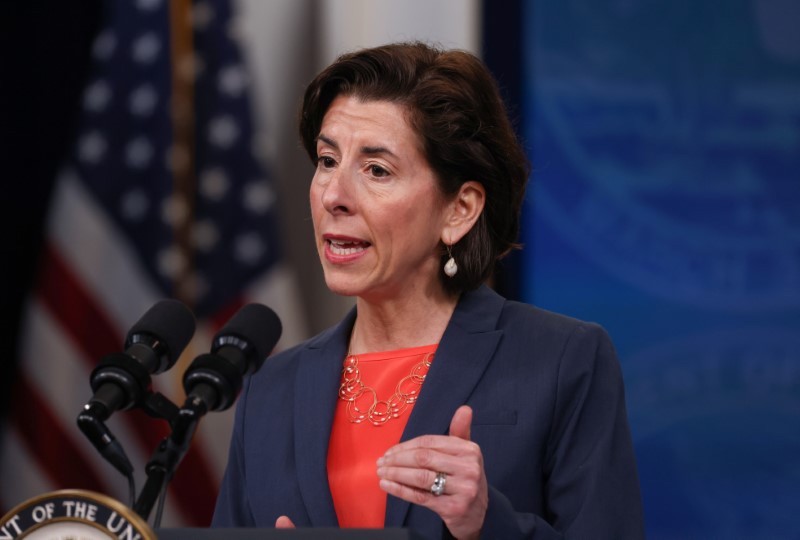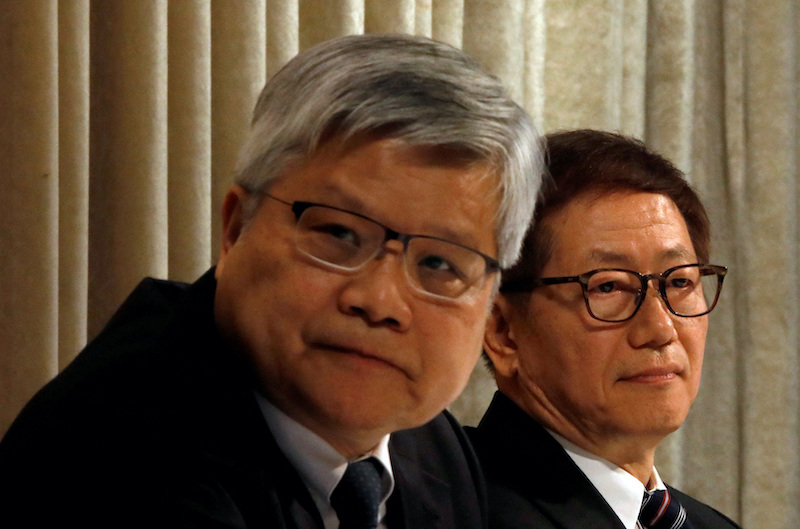US Commerce Secretary Gina Raimondo has begun announcing major funding awards that aim to fire up US production of computer chips.
Raimondo said she expects to make around a dozen funding awards within the next year, including multi-billion-dollar announcements that could drastically reshape US manufacturing of semiconductors.
Meanwhile, California chip giant Nvidia was being encouraged to sell semiconductors to China – but not their top-of-the-range AI products.
ALSO SEE: China Firms Rush to Poach Nvidia Clients With AI Chip Offerings
Raimondo announced the first award on Monday – $35 million to a BAE Systems facility in Hampshire to produce chips for fighter planes from the “Chips for America” semiconductor manufacturing and research subsidy programme approved by Congress in August 2022.
“Next year we’ll get into some of the bigger ones with leading-edge fabs,” Raimondo told reporters. “A year from now I think we will have made 10 or 12 similar announcements, some of them multi-billion dollar announcements.”
US wants 20% of chips made at home
In an interview, Raimondo said that the number of awards could go higher than 12. She said she wants the percentage of semiconductors produced in the United States to rise from about 12% to closer to 20% – though that is still down from 40% in 1990 – and to have at least two “leading-edge” US manufacturing clusters.
In addition, she wants the US to have cutting-edge memory and packaging production and to “meet the military’s needs for current and mature” chips.
Raimondo noted that the US currently does not have any cutting-edge manufacturing production and wants to get that to about 10%.
Companies like Intel, Micron, GlobalFoundries are among those seeking significant funding from the chip programme.
Raimondo said the programme has received more than 550 statements of interest and nearly 150 pre-applications, full applications, and concept plans. And given the extensive interest, there would be many disappointed companies.
“We have national security goals and we need to make our investments to hit those goals and we’re going to do that,” she added.
Congress has allocated $39 billion for manufacturing incentives to encourage companies to build and expand facilities and awards can be a mix of grants, government loans or loan guarantees.
The department has said direct funding awards are expected to range between 5-15% of project capital expenditures and total award amounts will generally not exceed 35% of project capital expenditures.
Nvidia ‘should sell AI chips to China’
Raimondo said US officials were talking with Nvidia Corp about permissible sales of artificial intelligence chips to China but emphasized that it cannot sell its most advanced semiconductors to Chinese firms.
The Commerce secretary said Nvidia “can, will and should sell AI chips to China because most AI chips will be for commercial applications.”
She added: “What we cannot allow them to ship is the most sophisticated, highest processing power AI chips, which would enable China to train their frontier models.”
Raimondo said she spoke a week ago to Nvidia CEO Jensen Huang and he was “crystal clear. We don’t want to break the rules. Tell us the rules, we’ll work with you.”
Raimondo said the department was working with Nvidia. “They want to do the right thing. Obviously they want to sell as many chips as possible.”
Nvidia declined to comment. Last week, Huang said the company was working closely with the US government to ensure new chips for the Chinese market were compliant with export curbs.
The California-based artificial intelligence chip designer has commanded more than 90% share of China’s $7-billion AI chip market, but analysts have said new US curbs on chip exports are likely to create opportunities for Chinese rivals to make inroads.
Last month Nvidia was reported to have told customers in China it was delaying the launch of a new China-focused AI chip until the first quarter of next year.
“Our plan now is to continue to work with the government to come up with a new set of products that comply with the new regulations that have certain limits.”
Nvidia warned during its November earnings that it expects a steep drop in fourth-quarter sales in China in the wake of the new US rules.
- Reuters with additional editing by Jim Pollard
ALSO SEE:
Nvidia ‘Working Closely With US Govt’ so China Chips Meet Curbs
US Chip Export Ban Seen as Big Opportunity for Huawei
US Curbs Set Off Sales, Tech Boom for China Chip Equipment Firms
ASML to Ship Top Tech to China Even as Dutch Chip Ban Starts























